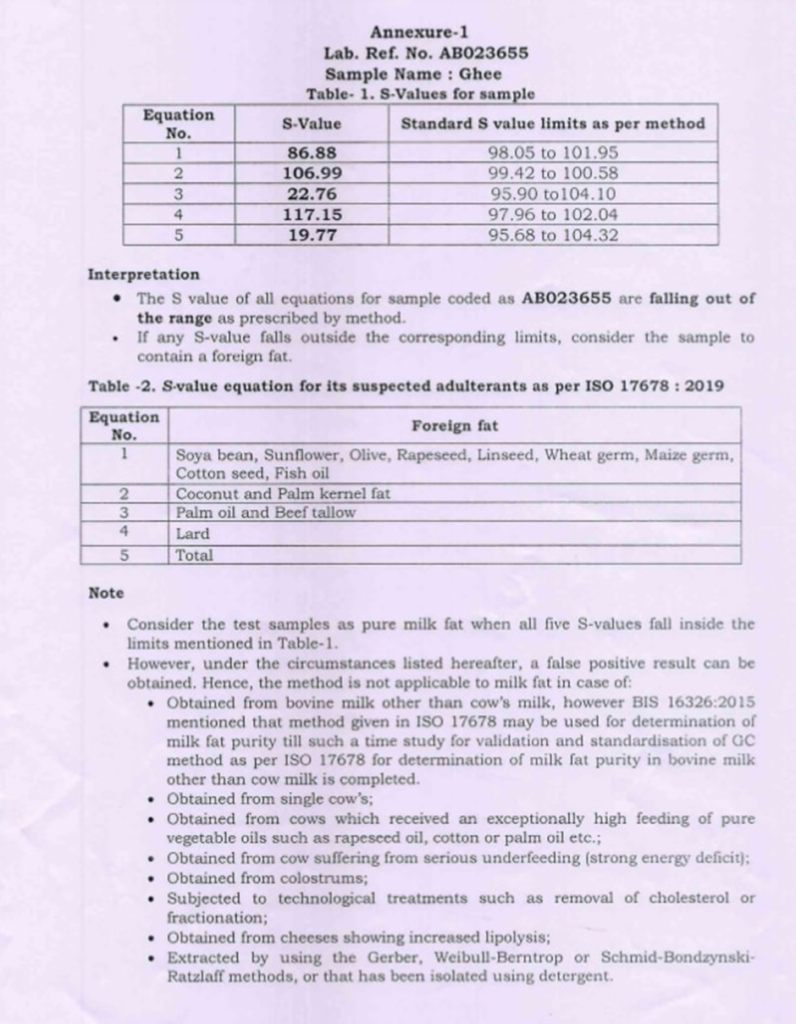A major controversy has emerged involving the sacred laddus distributed as prasadam at the world-renowned Tirupati Balaji temple. Recent lab reports have revealed that non-vegetarian fats such as pig fat, beef tallow, and fish oil may have been used in the ghee for preparing these sacred sweets. The findings have sent shockwaves across the country, with social media buzzing with outrage over what many view as a betrayal of Hindu faith. In response, the Union Health Ministry has requested an immediate report from the Andhra Pradesh Government, and a petition has been filed in the Supreme Court demanding swift intervention.
The scandal surfaced when lab tests, allegedly conducted by the National Dairy Development Board (NDDB), detected foreign fats in the ghee, including non-vegetarian ingredients.

The reports claim that animal-derived substances such as fish oil, beef fat, and lard were found in the prasadam, which is traditionally made using pure cow ghee. The Tirupati laddu is considered more than a food item— it is a sacred offering to Lord Venkateshwara, distributed to millions of devotees who expect it to be purely vegetarian.
This discovery has sparked national outrage. Many are calling it a deliberate attack on the faith of Hindus, while others are demanding accountability from those responsible. The former Andhra Pradesh Chief Minister, Chandrababu Naidu, has accused the previous YSR Congress Party (YSRCP) government, led by Y.S. Jaganmohan Reddy, of allowing such practices to take place under its watch. Naidu’s allegations have deepened political tensions, as the YSRCP has strongly denied the claims and suggested they are politically motivated.
Political and Religious Backlash
The revelations have ignited a heated political debate. TDP spokesperson Anam Venkata Ramana Reddy, in a press conference, disclosed the lab results and demanded a thorough investigation into the use of adulterated ghee in temple offerings. Reddy stated that the samples, tested in July 2024, revealed the presence of animal fats, sparking concerns that the sanctity of the prasadam had been compromised.
Meanwhile, the YSRCP government has pushed back, arguing that the reports are part of a political vendetta and insisting that further testing should be conducted to verify the findings. Legal threats have also been made, with YSRCP leaders warning that they will take action against those spreading what they term “false accusations.”
Devotees and Activists Demand Action
Consumer rights activists and devotees have been equally vocal about the issue. Ashim Sanyal, CEO of Consumer VOICE, expressed that the matter transcends food safety— it is a violation of trust. Sanyal pointed out that while animal fats may be legally permissible for consumption under Food Safety and Standards Authority of India (FSSAI) regulations, devotees expect the prasadam to be vegetarian. “It’s a deliberate violation of consumer rights,” he said, emphasizing that the sacred status of the laddu demands higher standards of integrity.
The outrage has been compounded by concerns over the testing process itself. Activists have questioned whether the labs conducting the tests were properly accredited by the National Accreditation Board for Testing and Calibration Laboratories (NABL). Doubts have also been raised about the sampling methods used, with some suggesting that the process may not have adhered to government guidelines.
Broader Concerns on Temple Management
This controversy has reignited calls for greater transparency and oversight in the management of Hindu temples, particularly those as prominent as Tirupati. Several commentators have pointed out that the issue may reflect deeper problems related to government control of religious institutions. There have been demands for a central audit of temple practices and stricter quality control measures to ensure that the sanctity of religious offerings is maintained.
Political analysts have also weighed in, noting that the controversy touches on a larger debate over how temples are governed in India, particularly in southern states. Many argue that state involvement in temple management has led to corruption and inefficiency, with political parties using religious institutions for their own ends.
Investigations and the Path Forward
In light of the uproar, the Andhra Pradesh government has initiated an investigation into the suppliers involved, and the Central Bureau of Investigation (CBI) may soon be tasked with conducting a more in-depth inquiry. Temple authorities have also vowed to take immediate action to restore trust among devotees, while consumer rights groups are calling for a re-test of the prasadam samples to ensure the accuracy of the lab findings.
Union Food Minister Pralhad Joshi has stepped in, ordering a detailed probe into the allegations and emphasizing the need for transparency in the process. The case has also made its way to the courts, with the Supreme Court now being asked to intervene.
Restoring Faith and Trust
The Tirupati laddu controversy has far-reaching implications, not just for devotees, but for the integrity of religious practices across India. As investigations continue, it is essential that temple authorities and government officials work together to ensure that the sanctity of the prasadam is preserved. Moving forward, stringent quality checks, transparent oversight, and accountability from all parties involved will be crucial in restoring faith in this revered tradition.
Discover more from DailyDozes NEWSPAPER
Subscribe to get the latest posts sent to your email.